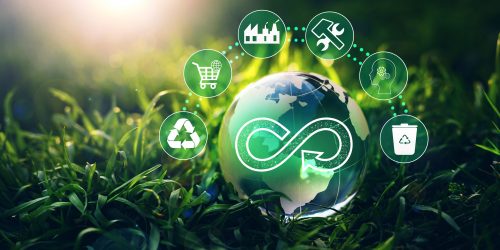Sustainable procurement: What is the vision of procurement decision-makers?
Sustainable procurement is now a priority for organisations of all sizes and across all business sectors. More than two-thirds of purchasing decision-makers also consider it “very important” to achieve their companies’ sustainable development goals1. Inspired by the various testimonials collected by EcoVadis, a global platform for evaluating and pooling performance in terms of Corporate Social Responsibility, we open the floor to purchasing decision-makers. These actors play a key role in the environmental and social transformation of their company, in the face of the growing demands of stakeholders. This is an opportunity to understand the real reasons that led them to turn to sustainable procurement, and what lessons they have learned from it today.
H2 – Sustainable procurement to be compliant
For the majority of purchasing decision-makers, sustainable procurement above all makes it possible to comply with legislation. As Erik Richter, Director of Sustainable Procurement at Groupe PSA reminds us: “The first pillar, compliance, is in a way obvious.”
It is true that regulations have become tougher over the years, whether it concerns climate change, business ethics, human rights, working conditions, public procurement, etc. This is particularly the case of the European Union, which is looking to accelerate its efforts with the Green Deal for Europe.
We can cite a few emblematic examples of the regulatory framework within the European Union:
– The UK Modern Slavery Act
Following the enactment of the UK Modern Slavery Act, certain organisations must publish an annual report indicating the measures taken to ensure that they are free of modern slavery and human trafficking throughout their supply chain.
– Duty of vigilance
This French law obliges large companies to publish a vigilance plan in order to prevent risks relating to the environment, human rights, and corruption in all of all their activities, as well as those of their subsidiaries, subcontractors, and suppliers around the world. Other European countries also wish to draw inspiration from this to apply similar measures.
– The European Corporate Sustainability Reporting Directive
This directive, which will soon replace that on non-financial reporting of companies (NFRD), will require certain types of companies to publish information concerning their supply chain, their products, their impact on ecosystems, their governance, etc.
H2 – Sustainable procurement to strengthen the supply chain
The implementation of a sustainable procurement policy is essential to building a resilient supply chain and becoming an agile procurement. This reality has also been exacerbated by the health crisis. As such, more than two-thirds of buyers and suppliers believe that their initiatives in favour of responsible practices have helped them to overcome this critical period1.
For several years, Mars has invested heavily in favour of a more responsible supply chain. Barry Parkin, director of sustainable development and supply within the multinational, underlines the benefits he derives from it today: “We have about 150 factories around the world. Amazingly, we were able to keep them all running throughout 2020 as demand went up and down and logistics challenges. The real learning for me is just how resilient supply chains really are. […] Our belief is that by making them more sustainable over the last few years, they’ve become more resilient.”2
For Bayer, this responsible and resilient supply chain is above all based on healthy relationships with its partners. Thomas Udesen, Purchasing Director of the industrial group specialising in chemicals and pharmaceuticals, and co-founder of a purchasing community committed to sustainable development called “Sustainable Procurement Pledge“, explains: “As a company, Bayer has found that the power of partnership and investment in serious relationships for more than 10 years has truly paid off. […] We have not experienced any interruptions in our physical supply chains so far during this Covid period. Even better, although we are not out of the woods yet, it is clear that we have excellent partners.“3
Sustainable procurement to create value
In addition to becoming compliant and increasing the resilience of their supply chain, companies want to go even further. They want to make sustainable procurement a lever for performance and differentiation in the market.
Erik Richter, Sustainable Procurement Director at Groupe PSA confirms this idea: “This is where things get more interesting: it’s not just about being compliant, but about translating this compliance into performance. This implies being smarter than the market, and simply faster than what people expect of us.”
Clariant aims to become a world leader in the chemical industry with respect to its performance in terms of sustainable development. Cesare Guarini, former director of the Swiss company’s procurement strategy and sustainability initiatives, explains how this translates to purchasing: “The objective is to make a contribution by converting costs into added value and focusing on three main areas: sustainability, innovation, and growth markets. To this end, we will be deploying collaborative programmes with our suppliers.”
In the light of these testimonials, sustainable procurement policies seem perfectly aligned with current economic challenges, thereby contributing to the Corporate Social Responsibility strategy. A true axis of competitiveness, there is no doubt: sustainable procurement has become a must.



